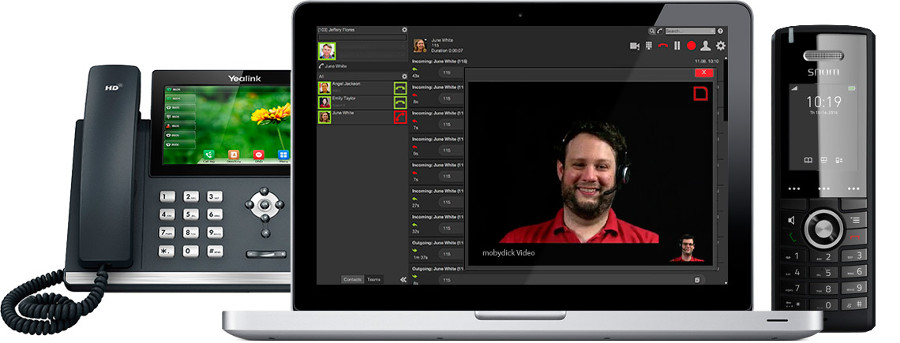
It’s easy to set up, manage and maintain
Traditional phone lines can be difficult to set up and maintain, not to mention that they can come with a notoriously high price tag. VoIP, on the other hand, is relatively easy to install, configure and maintain – even for individuals who aren’t exactly what you would call tech savvy.
There are VoIP software solutions and web browser options that can make managing the system much easier, especially when adding new users. Web portals also make adding, moving, and changing system configurations simpler and more convenient. You can find our recommendation of the best and easiest VoIP providers here.
It increases flexibility and mobility for users
VoIP technology allows users to integrate a wide variety of software systems, such as remote conferencing, file sharing and email, which can be great assets as it increases the flexibility of your users.
It’s easy to see how this kind of flexibility and mobility provides a huge advantage for users who are always on the go, particularly corporate staff who travel frequently. And since long distance calls via VoIP is relatively cheaper compared to traditional landline or cellular phone calls, it’s also a great money saver.
It can limit company expenses
Setting up traditional lines within a facility can be a costly endeavor. Setting up and managing a VoIP system, on the other hand, is comparatively cheaper. Here’s a list of budget-friendly VoIP alternatives to Skype.
In addition, calls between two or more PCs – over the internet – are generally free. This means that communication between various colleagues and departments will not cost the company any money, as long as it’s done via your VoIP service. Calls done from PC to landline can however have a cost attached to them, but the rates are significantly lower compared to traditional cell phone or landline phones.
It helps to increase staff productivity
VoIP technology can help improve the productivity of everyone in your organisation, from executives to directors. Your VoIP system will provide users with the ability to host virtual meetings, conduct international phone conferences at very little cost, attach important company documents and share significant data through video conferencing.
In recent years, VoIP technology has advanced significantly – especially in terms of voice clarity, so that it has become virtually indistinguishable from more traditional phone conversations. The earlier versions of VoIP often produced distorted phone calls, dropped calls, and lagging transmissions. This is no longer the case, however. This is why VoIP has become more appealing to SMEs and organisations around the world.
It can enable you to compete with bigger companies
There are plenty of things a company must do in order to compete effectively with bigger, more established organisations. And having an efficient and cost-effective communication solution is one of them.
VoIP offers a functionality that enables users to manage internal and external communications in a more cost-effective and practical way. You will be able to communicate with prospective clients at little to no financial cost, talk to partners and customers through long distances, and compete with businesses on an international level.
It can be scaled to meet demand
It’s not easy to determine how many phone lines you’ll need, especially not when you’re still growing as a company. When you’re adding more personnel, more offices, or creating new departments, you will need to constantly ensure that your communications system is up to date.
A VoIP solution does not require additionally expenses, whether you’re adding or removing users. With this system, you can add a new line as soon as you add a new staff member. And when an employee leaves or transfers, you can just as easily reassign the existing line or remove it completely. You can easily and conveniently scale the VoIP system to meet your needs.
It comes with a wide range of call features
There are a myriad of call features that users have come to expect from traditional phone lines. These same features are also available with hosted Voice over Internet Protocol systems, including call transfer, call hold, call forwarding, call hunt, auto-attendant phone menus, conference calling, and more.
Of course, your company still need to find the right hosted VoIP service to get the features and capabilities that your organisation require. However, the bottom line is that you won’t sacrifice anything, in terms of modern call features, when opting for a hosted VoIP feature.
